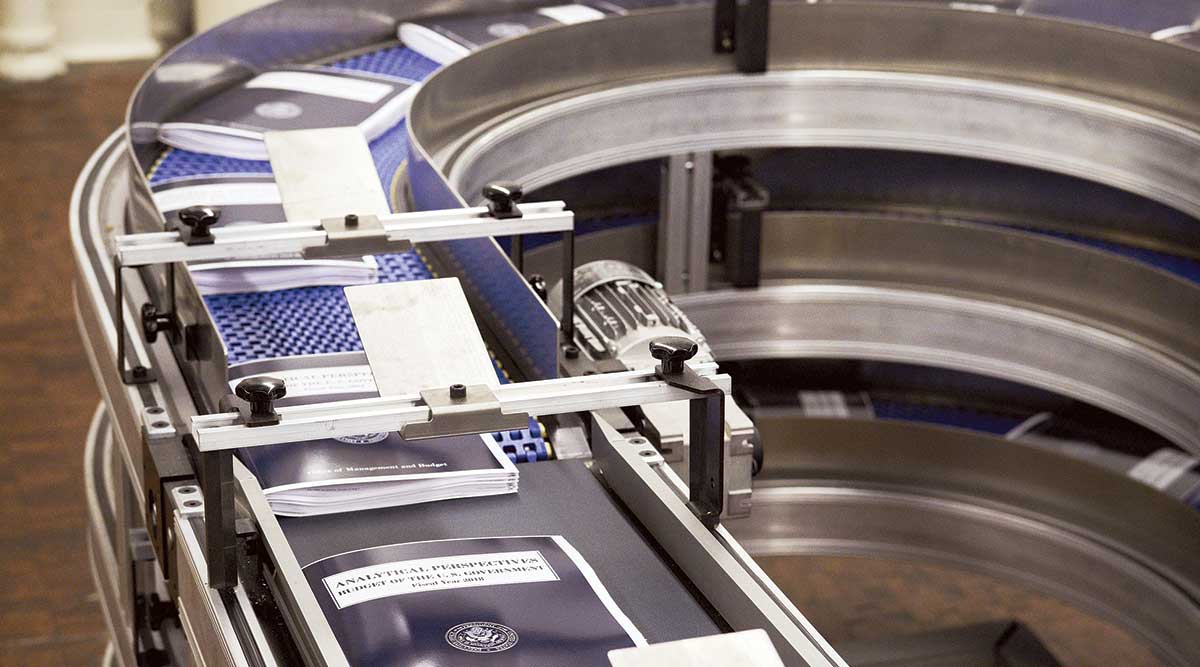Senior Reporter
Budget Would Spread Tolls

This story appears in the May 29 print edition of Transport Topics.
Additional tolls throughout the country and encouraging states to raise revenue to pay for highway projects were key proposals in President Donald Trump’s long-awaited infrastructure plan, detailed in a fiscal 2018 budget request for federal agencies that was released last week.
Under the $4.1 trillion budget request, the Department of Transportation would receive $76 billion. Of that, $16.2 billion would be for discretionary spending, 12.4% below the enacted fiscal 2017 level. Proposed funding for truck safety grants would increase.
The infrastructure plan stressed that restrictions on tolling interstate highways impedes public and private investment in roads.“We should reduce this restriction … and weigh the relative merits of tolling assets,” according to the plan, unveiled May 23.
The $1 trillion, 10-year infrastructure funding proposal — which would be jump-started with $200 billion in federal spending — raised concerns from trucking stakeholders who historically have opposed efforts to expand tolling. Executives in commercial surface transportation argue tolls along existing interstates would be a form of double taxation, since motor carriers already pay for surface transportation upkeep via fuel taxes.
However, lifting or relaxing the federal ban on tolling interstate highways falls squarely under Congress’ jurisdiction; states looking to add tolls along new highway lanes require an exemption.
Commenting on the budget proposal, American Trucking Associations Executive Vice President for Advocacy Bill Sullivan said, “While ATA is encouraged by the apparent focus on infrastructure investment in this budget, an investment we strongly support and look forward to helping the administration and Congress shape, we are deeply concerned by the proposal to loosen the restrictions on interstate tolling. Quite simply, time and again, proposals to use tolls to fund highways have failed.”
Proponents of tolling praised the administration and urged critics to realize value in accessing an additional source of funding for highway projects. Tolls are examples of public-private partnerships, or P3s, which are systems that connect financiers with government agencies to develop a project. They were touted by Trump during the presidential campaign.
“Congress should give states access to one more tool in the toolbox by allowing them to toll their interstate highways specifically to rebuild them. This wouldn’t be a mandate; no state would be required to toll their interstates. This would simply give states an option, the flexibility to choose tolling if it makes sense to them,” said Patrick Jones, CEO of the International Bridge, Tunnel and Turnpike Association.
Aside from tolls, the administration calls on states to move “toward a model of independence” and raise revenues to fund infrastructure. This type of self-help proposal is termed as “devolution” by most transportation observers. A transfer of transportation authority from the federal agencies to states is contrary to Republican ideology, according to Rep. Bill Shuster (R-Pa.), chairman of the House Transportation and Infrastructure Committee.
The plan also would support private investors in building and operating highway rest stops.
“The impact of this [$200 billion] investment will be amplified with other administrative and regulatory actions the administration plans to pursue,” according to the budget request.
Transportation Secretary Elaine Chao acknowledged last week while speaking with reporters that groups and individuals would be skeptical of the plan, which she said is meant to incentivize private sector investments. “Obviously, there are some questions involved with that, and we would hope, also, to provide more details as the time goes on,” she said.
On Capitol Hill, Republicans pledged to continue to draft their version of an infrastructure plan in the Senate, while Democrats emphasized that a plan backed primarily by private capital would not win their support.
“The budget pretends to increase infrastructure investments by $200 billion, but that is a sham,” said Rep. Peter DeFazio (D-Ore.), ranking member on the Transportation and Infrastructure Committee. “The ‘$200 billion investment’ is a 10-year figure with zero details about how or where that money is spent.”
Pertaining to the trucking industry, the Federal Motor Carrier Safety Administration would receive $657.8 million.
The regulatory agency’s budget proposal calls for $283 million for motor carrier safety and operations programs and $374.8 million for motor carrier safety grants — slightly higher than the enacted fiscal 2017 levels. Current funding is $277.2 million for safety and operations programs and $367 million for safety grants.
“These funds will enable FMCSA to sustain its programs with critical resources to improve safety operations, provide much-needed inflation-level increases in safety grants and explore transportation technology innovations intended to improve the nation’s economy,” according to the request.
Under the proposal, the Motor Carrier Safety Assistance Program would receive $298.9 million in fiscal 2018, or $47.7 million more than the fiscal 2017 enacted level. Regulators rely on the program to assist states so they may reduce crashes and hazardous materials problems involving commercial vehicles.
A contract for a drug and alcohol clearinghouse to track commercial drivers also will be awarded in fiscal 2018, the budget request noted. “The development of the drug and alcohol clearinghouse will ensure that drivers who have tested positive or refused testing are not allowed to operate until they have completed the required substance abuse program,” according to the request.
Under the request, the Federal Highway Administration would receive $45 billion, the Pipelines and Hazardous Materials Safety Administration would receive $259.1 million and the National Highway Traffic Safety Administration would receive $597.6 million for safety grants.
Funding for the Transportation Investment Generating Economic Recovery, or TIGER, infrastructure grants would be eliminated.

